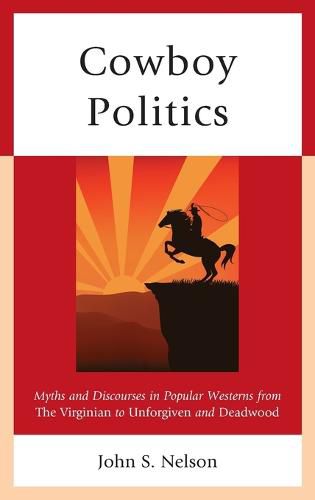Readings Newsletter
Become a Readings Member to make your shopping experience even easier.
Sign in or sign up for free!
You’re not far away from qualifying for FREE standard shipping within Australia
You’ve qualified for FREE standard shipping within Australia
The cart is loading…






The politics of popular westerns are surprising in substance and significance, especially of late. Cowboy Politics shows how westerns in literature, cinema, and television face the challenges of Western Civilization even more than the perils of American frontiers. Its strategy is to compare key westerns with major theories of modern and postmodern politics. So it analyzes novels from Owen Wister to Zane Grey and Larry McMurtry. It focuses on films from the western revival beginning in the 1990s and featuring Clint Eastwood’s Unforgiven, while its interest in TV stretches from singing cowboys and Gunsmoke to David Milch’s Deadwood. Critics are apt to find in westerns the modern politics of Thomas Hobbes and John Locke. They tap devices of individuality, rationality, contract, sovereign enforcement, and representation to overcome the chaotic violence of a wild zone. Cowboy Politics examines how westerns often find such measures insufficient to tame the West as a culture of honor and anger that deteriorates into feud-al vengeance. Instead westerns see the West as the sunset land that is already growing old and moving on. So westerns seek fresh starts informed by comparing civilizations more than demonizing savages. Westerns worry that modern politics devolve into exploitation, oppression, spectacle, and terror. So they pursue supplements in such postmodern politics as republicanism, perfectionism, populism, feminism, and environmentalism. Especially westerns explore politics of persuasive speech-in-action-in-public, doing beauty, and self-reliance in the modes of Hannah Arendt and Ralph Waldo Emerson. The first two chapters of Cowboy Politics explain how westerns do political theory for popular audiences by making many of our myths: the symbolic stories of individuals and communities which we live daily. The next three chapters trace the initially modern theories of government in many westerns. Then western turns to republican honor, rhetoric, response-ability, and character tracking occupy the following four chapters. And these set the stage for another four chapters on western attention to postmodern terror, mythmaking, celebrity, spectacle, and forgiveness. The final two chapters analyze how late,
satirical, and transformative westerns develop realist defenses for their surprisingly postmodern politics.
$9.00 standard shipping within Australia
FREE standard shipping within Australia for orders over $100.00
Express & International shipping calculated at checkout
The politics of popular westerns are surprising in substance and significance, especially of late. Cowboy Politics shows how westerns in literature, cinema, and television face the challenges of Western Civilization even more than the perils of American frontiers. Its strategy is to compare key westerns with major theories of modern and postmodern politics. So it analyzes novels from Owen Wister to Zane Grey and Larry McMurtry. It focuses on films from the western revival beginning in the 1990s and featuring Clint Eastwood’s Unforgiven, while its interest in TV stretches from singing cowboys and Gunsmoke to David Milch’s Deadwood. Critics are apt to find in westerns the modern politics of Thomas Hobbes and John Locke. They tap devices of individuality, rationality, contract, sovereign enforcement, and representation to overcome the chaotic violence of a wild zone. Cowboy Politics examines how westerns often find such measures insufficient to tame the West as a culture of honor and anger that deteriorates into feud-al vengeance. Instead westerns see the West as the sunset land that is already growing old and moving on. So westerns seek fresh starts informed by comparing civilizations more than demonizing savages. Westerns worry that modern politics devolve into exploitation, oppression, spectacle, and terror. So they pursue supplements in such postmodern politics as republicanism, perfectionism, populism, feminism, and environmentalism. Especially westerns explore politics of persuasive speech-in-action-in-public, doing beauty, and self-reliance in the modes of Hannah Arendt and Ralph Waldo Emerson. The first two chapters of Cowboy Politics explain how westerns do political theory for popular audiences by making many of our myths: the symbolic stories of individuals and communities which we live daily. The next three chapters trace the initially modern theories of government in many westerns. Then western turns to republican honor, rhetoric, response-ability, and character tracking occupy the following four chapters. And these set the stage for another four chapters on western attention to postmodern terror, mythmaking, celebrity, spectacle, and forgiveness. The final two chapters analyze how late,
satirical, and transformative westerns develop realist defenses for their surprisingly postmodern politics.